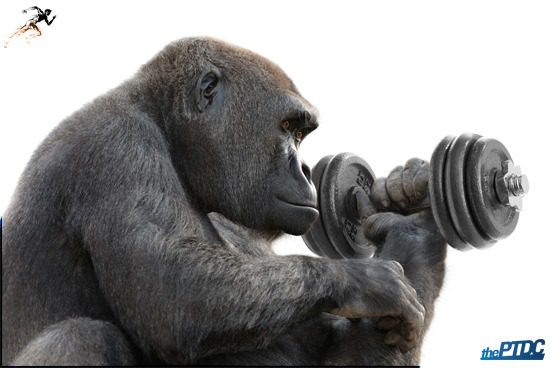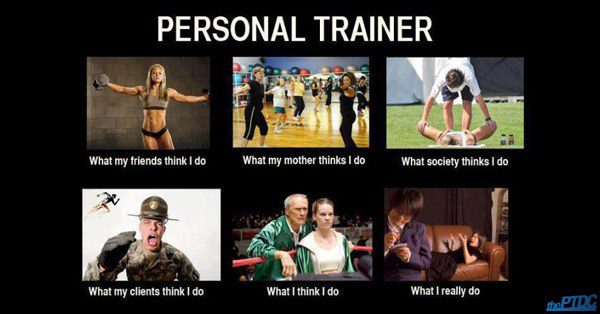When friends and family hear you're pursuing a career as a personal trainer they may have some very unrealistic ideas about what your life will become.
Maybe they think you'll be the next Jillian Michaels, Bob Harper, or Chris Powell; reaching celebrity status for helping others lose weight and sweat a ton on live television. You probably even have your own preconceived ideas about how you'll stand out among the crowd, change the world and help hundreds of people lose oodles of fat and gain new confidence.

But really, here's what everybody is thinking ...
While those ideas aren't bad and have some grain of truth, the process of getting to that point may come as a shock.
Like most things in life, you only truly succeed in your career after making mistakes and learning from them.
You can have the best personal trainer certification and business mentors in the world, but that won't prepare you for your own experiences as a new personal trainer.
Here's 3 things that you need to know:
1. Get Rid of Unrealistic Preconceived Ideas
The "I have the utmost of knowledge"- Syndrome
You want to change the lives of your clients - that's your ultimate goal as a fitness professional. But thinking you know everything there is to know about fitness and weight loss now that you have a certification will set you up for a harsh reality in a hurry.
People don't like arrogant, know-it-all jerks. You're serving people as a profession. Don't forget that. Fitness may be a passion for you but as a personal trainer you are there for the person. First priority will be how you can best serve the one paying you for your knowledge and expertise.
Regardless of your knowledge, have a humble attitude and willingness to learn from your clients. You'll learn more from hands-on practice from a variety of clients than you will reading textbooks and articles.
"I'm going to have so many clients"
Maybe you will. Maybe you won't. Depending on your location as a trainer, whether it's at a big box gym, community gym, or making house calls, building a committed client base will take time and effort. The choice of place to work varies, as PTDC head coach Jonathan Goodman notes in Ignite the Fire, deciding where to work initially is largely based off of how much support you wish to have in getting clients.
You may find that you have a lot of "leads" initially but may quickly become discouraged when you realize folks aren't as passionate about starting a new lifestyle as you are. They may sound excited to begin with, but if you don't know the proper ways to communicate your value and seal the deal with a commitment from them you may end up with a dead end.
Follow up on all of your leads, even if they didn't seem overly zealous to start training. Don't be quick to judge. The clients that seem most likely to give up can potentially turn out to be some of the best long-term clients.
Learn to market yourself. Get exposure and build relationships.
READ ALSO: 7 Questions to Ask When Starting a Gym
"Do it Like this"
Communication is one, if not the, most important training tool you have.
Through your communication skills -- active listening, body language, tone, etc. You're conveying and marketing yourself.
Simple things you do demonstrate who you are to the potential client. Are you tapping your pencil? Twirling your hair? Talking excessively loud or quiet? You can seem inattentive, uncaring, ignorant or even obnoxious if you don't know how to effectively communicate.
Carry yourself with confidence but not arrogance. Look the person in the eye but don't stare them down. Talk at a normal volume. Be yourself but be professional. Don't fidget, stay focused on what the person is saying and take notes.
READ ALSO: How to Sell Personal Training in 5 Steps
How do you describe to someone that has never worked out before how to do a ball chest press? What about something as simple as a push-up? Exercises may be "old hat" to you but to the newbie client can seem like speaking a foreign language.
How do you say what you mean while getting the person to effectively understand and complete the desired request?
Start simple. Don't over complicate your explanations. "Say what you mean and mean what you say."
When instructing a client on how to do an exercise think about what steps you take when you're getting in that position. For example, the push up -- it may seem like over kill but be very descriptive: "First, you have to get down on the floor on your hands and knees. Then bring your feet together, your hands slightly wider than chest width apart, lift your butt, etc."
Don't assume that someone knows how to do things.
2. Be Teachable
There's always going to be something to learn. Information on fitness and nutrition is updated constantly. Do your research and homework regularly. Find a trainer who has done it longer than you and pick their brain.
- How do they get new clients?
- How do they design their programs?
- What setbacks have they had?
- How did they overcome those setbacks?
3. Be Yourself
When I first decided to become a trainer I had a great mentor. He had been training clients for years and seemed as if his appointment book was always full. He regularly tested my knowledge and challenged me with his questions.
Some of the best advice he gave me was "Don't try to be me." At first, I thought maybe I'd insulted him or he was politely trying to get me to stop coming to him with all of my questions. What he meant was don't try to have his training style. It was important for me to "find myself" as a trainer.
His training style was loud, slightly obnoxious, "If you puke you win a sweatshirt" style of training. I admired this man for his expertise and knowledge. He was right though; I couldn't mimic his training style because it just wouldn't be me.
I consider myself outgoing, but not excessively loud or grumbly. I equated him to a silver back gorilla while I was more like a giraffe. I wanted to stand out above the crowd and as an individual in my own unique way.

Through my experience, I've found that I prefer a balanced approach. I like to read people for a few sessions before I decide how much I need to "turn it up" to get the results I'm after.
At times I may raise my voice, occasionally yell "Push," but other times I quietly encourage.
Being confident in who you are as a person, as well as in your skills and abilities is priceless. No amount of credentials can give that to you. Your confidence in yourself will create a confidence and trust in the relationship that develops between you and your clients.










